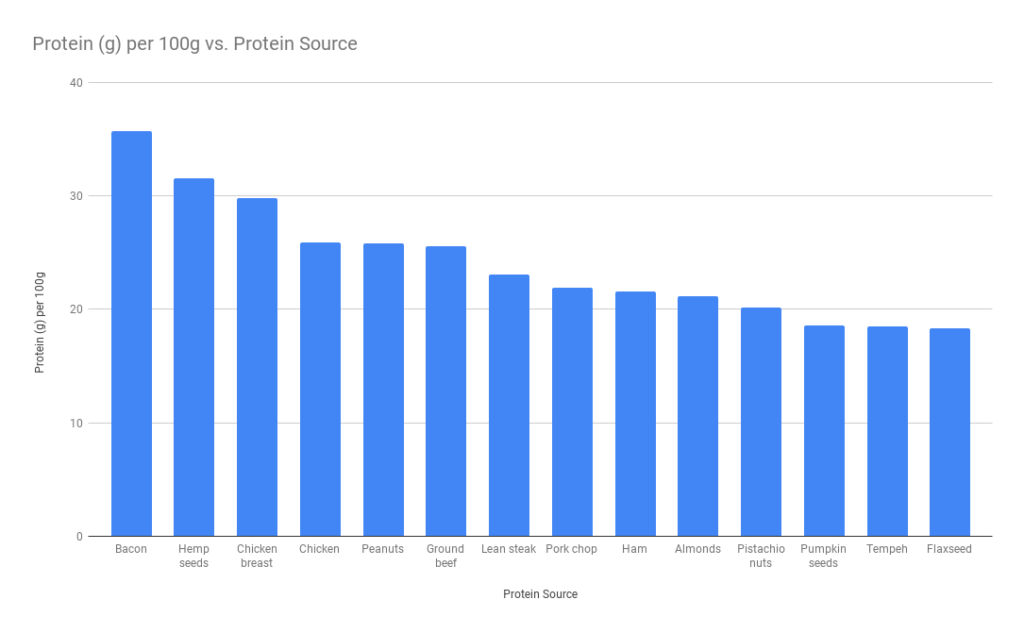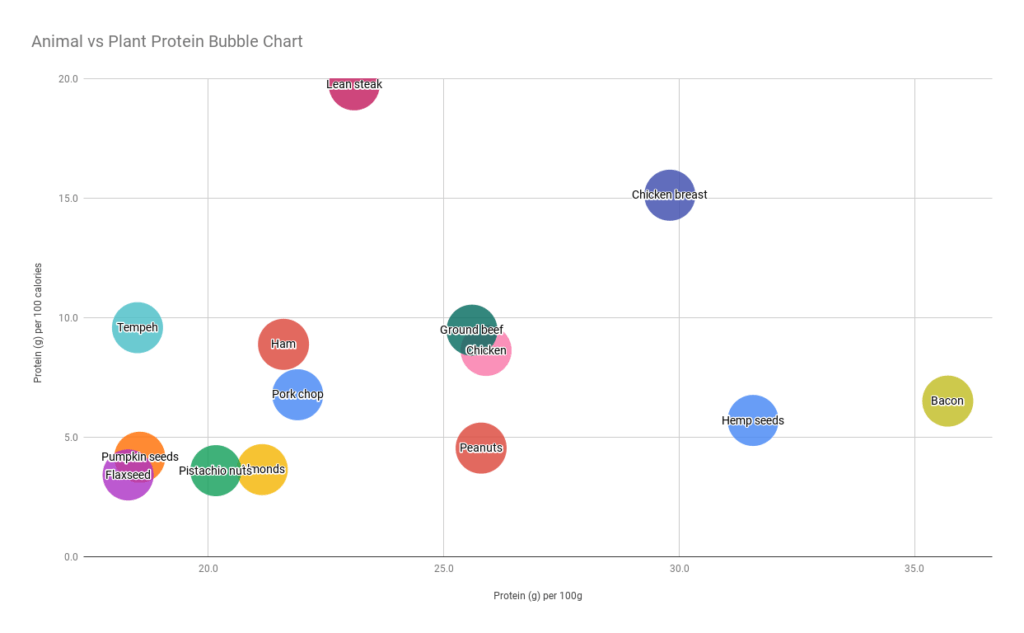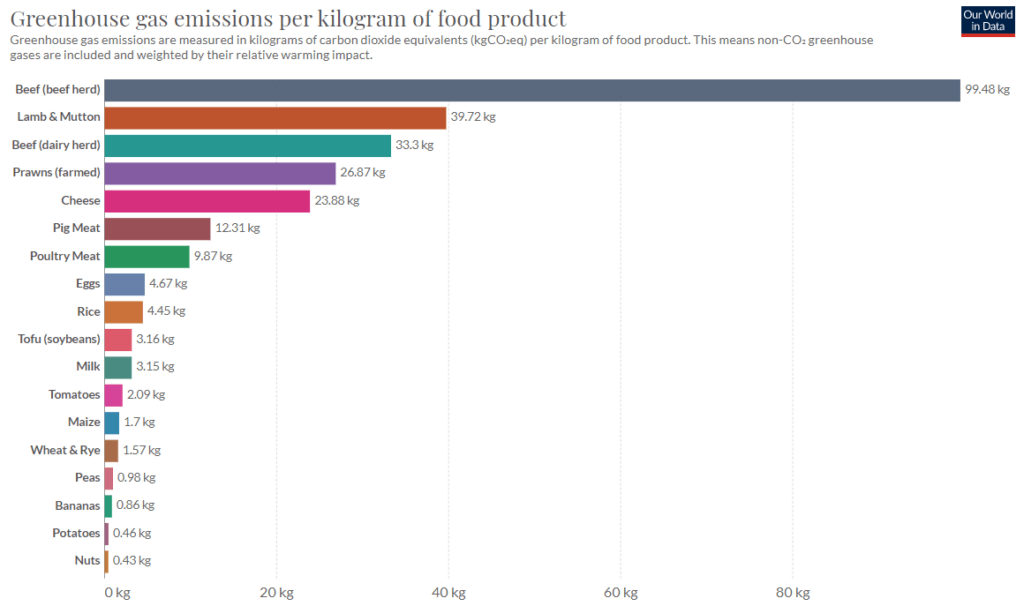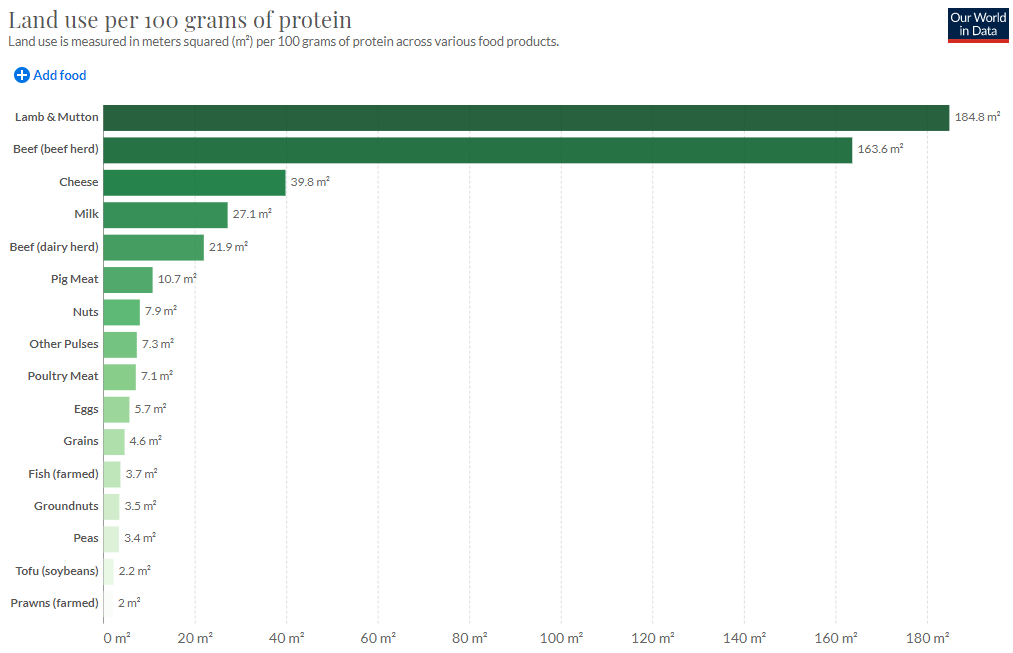Most of us in Western countries grew up being taught that you needed multiple servings of meat every day if you wanted to be healthy and grow muscle.
With NFL and NBA players going vegan for performance, and much easier access to plant-based substitutes (e.g. Beyond Burger), many are re-evaluating if meat is truly necessary as a protein source.
I’ve done my best to make this a fair and unbiased comparison of plant and meat protein sources. The main things we’ll look at are:
- The amount of protein in top plant (e.g. peas, hemp) and meat sources
- The digestibility and absorption of protein sources
- The risks and benefits of both vegan and meat proteins
Table of Contents
Comparing The Best Vegan Protein Sources to Meat
Let’s start by looking at the top plant and meat protein sources individually, and then we’ll plot them against each other to see how they compare.
Protein in Plant Sources
The sources below are whole foods or minimally processed. I had to draw the line somewhere, or it’s hard to make a fair comparison.
So soybeans were considered for the list, but tofu was not because it’s a processed food (firm tofu has 9.9 grams of protein per 100 grams, and 10.9 grams per 100 calories), same goes for foods like PB2 or vital wheat gluten.
With that out of the way, these are the best whole vegan sources of protein:
| Vegan Protein Source | Protein (g) per 100g | Protein (g) per 100 calories |
|---|---|---|
| Seaweed (dried) | 57.4 | 20.1 |
| Hemp seeds | 31.6 | 5.7 |
| Peanuts | 25.8 | 4.5 |
| Almonds | 21.1 | 3.6 |
| Pistachio nuts | 20.2 | 3.6 |
| Pumpkin seeds | 18.5 | 4.2 |
| Tempeh | 18.5 | 9.6 |
| Flaxseed | 18.3 | 3.4 |
Like many vegetables, seaweed is high in protein, it just has a high water content. When you dry it out it’s kind of cheating here.
Protein in Meat Sources
I compiled a list of the most commonly ate meat products and looked up the protein content for each.
Note that I tried to pick the most common and least processed option for each. For example, the ground beef data is for 70%/30%.
| Meat | Protein (g) per 100g | Protein (g) per 100 calories |
|---|---|---|
| Bacon | 35.7 | 6.5 |
| Chicken breast | 29.8 | 15.1 |
| Chicken | 25.9 | 8.6 |
| Ground beef | 25.6 | 9.5 |
| Lean steak | 23.1 | 19.7 |
| Pork chop | 21.9 | 6.8 |
| Ham | 21.6 | 8.9 |
If you compare the plant protein sources to these, the amount per 100 grams is actually fairly similar, although the meat in general has a bit more.
The biggest difference is that meat tends to have a significantly greater amount of protein per 100 calories. When you look at nuts and seeds, they have a lot of fat in addition to protein.
Plant Protein vs Animal Protein Chart
Below is a chart of the protein in vegetables vs meat per 100 grams.
While most of the top spots go to meat products, some of the plant protein sources are sprinkled in.
Plant Protein vs Animal Protein Bubble Chart
A more interesting way to look at nutrition in my opinion is with a bubble chart comparing both the amount per 100 grams and per 100 calories.
The perfect protein source here in theory will have a high amount in both categories, which means it will trend towards the top right of the chart.
It’s pretty clear that the meat protein sources are the most efficient sources of protein, meaning you don’t need to eat too much to get the amount you’re looking for.
The amount of protein per 100 grams is similar in both plant and meat protein sources. However, meat protein sources generally have more protein per 100 calories. This is why it can be hard to hit particular macros on a vegan diet without the help of processed protein sources like protein powder.
Animal Protein vs Plant Protein Absorption
One argument that I’ve seen is that even if you get enough protein from plants, it’s not as digestible as animal protein.
While it’s not perfect, the Protein digestibility-corrected amino acid score (PDCAAS) is the best measure of overall protein quality that we have.
It’s not available for all foods, but here’s a table of the meat and plant sources that are available:
| Food | PDCAAS value |
|---|---|
| Potato | 0.99 |
| Chicken | 0.95 |
| Beef | 0.92 |
| Soy | 0.91 |
| Chickpeas | 0.78 |
| Vegetables | 0.73 |
| Peanuts | 0.52 |
Unfortunately there’s no data for nuts or seeds.
Overall, meat tends to have a PDCAAS value of 0.9+, while vegetables range anywhere from 0.5 to 0.9 for the most part.
Keep in mind that PDCAAS only looks at a protein source in isolation, and is calculated based on amino acid content. It’s very similar to seeing if a protein is “complete” or not.
But people don’t eat just one protein source, and research shows that as long as you get protein from different sources that have varied amino acid profiles, it’s not a big deal.
I’ve written a more extensive guide to vegan complete protein sources if you’re interested.
Meat generally has a more balanced profile of essential amino acids, which is usually what is considered higher quality. However, there’s nothing in particular that stops the absorption of amino acids from plant protein, they’re just often incomplete protein sources. A diverse set of plant protein sources should still rival the quality of meat protein in theory.
Plant Protein vs Animal Protein for Building Muscle
Research shows that the results from vegan and whey protein powder are essentially the same in terms of building muscle.
Logically it makes sense: All you need to build muscle are amino acids.
Since no one just eats one protein source, it shouldn’t matter that beans are low in methionine.
A recent study found that:
Dietary protein is associated with musculoskeletal health independently of dietary pattern
In other words, whether someone was vegan or not made no difference on muscle mass. The biggest predicting factor is simply the amount of protein in your diet.
It’s obviously more of a challenge to get the same level of protein as a vegan, but it can be done with some extra planning.
When it comes to building muscle, it doesn’t matter whether someone eats vegan or meat protein, as long as there’s enough of each essential amino acid. Products like Beyond Burgers and vegan protein powder make getting a high amount of protein on a vegan diet much easier these days.
Risks of Animal Protein
The final thing to consider is not just the amount or quality of protein, but the safety of it.
While it’s not the protein itself that causes the issues, recent research has started to show that certain compounds in certain types of meat can cause significant health risks.
The 2 main risks appear to be an increased risk of colorectal cancer and heart disease.
Is Meat Carcinogenic?
The WHO currently classifies 2 types of meat as carcinogenic (cancer-causing):
- Processed meat – Group 1 (Known carcinogen)
- Red meat – Group 2a (Probably carcinogenic)
Red meat covers all muscle meat (e.g. pork, beef, etc.), while processed meat refers to meat that has been cured, fermented, or otherwise processed (e.g. hot dogs, sausages, beef jerky).
Specifically, these types of meat or ties to colorectal cancer, which is the third most commonly diagnosed cancer in the world.
Research shows that the likely mechanism behind this increased risk is from mutagenic compounds that form when meat is cooked (especially in well-done meat).
The one caveat is that just because smoking and processed meat are group 1 carcinogens, doesn’t mean they are equally as bad. Even without looking up the numbers, smoking gives you a much larger increased risk of developing cancer than eating the amount of meat that most people do.
Meat is High in Saturated Fats
The effect of saturated fats on health is a complex topic that I’m not going to do a full review of here.
It’s a controversial topic, and a lot of the fears around saturated fats were purposely promoted by the sugar industry in past decades.
Still, research shows that there is some association between saturated fats and heart disease, and that you’re better off limiting your intake and replacing it with other types of fat.
Meat is relatively high in saturated fat, so this may present an additional health risk.
Alternatively, it’s actually hard to find vegan saturated fat and cholesterol sources.
Eating red meat and processed meat is known to cause an increased risk of developing cancer. The high saturated fat content of many meats may also pose cardiovascular health risks.
Risks and Benefits of Plant Protein
Vegan diets are generally associated with lower inflammation and better health.
Note that some of this is due to people who go vegan are usually more health-conscious and active people.
In terms of plant protein intake, a study on data from a cohort of over 400,000 Americans from 1995 to 2011 found that:
…greater intake of plant protein was significantly associated with lower overall mortality and cardiovascular disease mortality independent of several other risk factors.
They controlled for some lifestyle factors, but it’s pretty much impossible to control for everything.
There’s also evidence that the relatively lower amounts of methionine, lysine, and tryptophan in a vegan diet can protect against not only cardiovascular disease, but also:
- Atherosclerosis
- Cancer development
- Chronic degenerative diseases
It’s a complex topic, but it does appear that the makeup of plant protein can provide significant long-term health benefits.
Environmental Impact of Vegan Protein vs Meat
One of the main reasons people go vegan is because it’s much better for the environment.
Our World in Data has 2 great graphs that make the impact differences between protein sources clear.
First, here’s a look at the emissions per 100 grams of a variety of protein sources:
You’ll notice that every single meat creates many times the emissions of any plant protein. Even if you look at milk protein (in the case of whey protein), it still produces about 3 times the emissions of peas.
Similarly, meat requires much more land per 100 grams of protein, and that’s factoring in the disgusting factory farms where animals are packed into barely livable spaces.
Again, milk takes about 9x the land use per 100 grams of pea protein.
The environmental impact is not only a case for plant protein vs meat, but also one of the biggest benefits of vegan protein powder vs whey.
Plant proteins are way more environmentally friendly than meat, and it’s not even close.
Is Vegan Protein Better Than Animal Protein?
All amino acids come from plants originally, they just shift around to form different proteins throughout the food chain.
In terms of muscle building, amino acids are amino acids, and as long as you’re getting enough of them, vegan protein and animal protein sources can be considered essentially identical. That being said, it’s easier getting a high level of protein from meat products.
But there is a strong argument that vegan protein is better than animal protein because of the health risks that come with consuming red meat and processed meat. The other compounds and nutrients that come along with protein in animal protein sources clearly have some negative health effects.
In addition, we saw that research shows that vegan protein likely has protective effects against cancer and other diseases.
And finally, plant protein produces far fewer emissions and requires much less land than meat.




